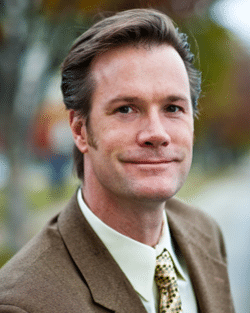
Featured Collaborator for July & August: Hal Movius
Blog Interview with Hal Movius, president of Movius Consulting and senior consultant to The Consensus Building Institute
Interview with Hal Movius, president of Movius Consulting and senior consultant to The Consensus Building Institute
What are your main areas of research?
Lately I’m interested how we can help people to negotiate with greater emotional and behavioral confidence, without becoming cognitively blinded. There’s a fair amount of research on how judgmental overconfidence can worsen conflict, but very little on why most of us dread negotiating, even though it is a critical life skill. While there are self-assessment tools that people use to categorize their negotiating styles, these are largely useless because 1) people don’t realize how powerful and varied situations can be, and therefore how varied their own behaviors will be, and 2) many people respond in self-enhancing ways, claiming to be assertive or collaborative when in fact the modal human response to conflict is avoidance. So I’m in interested in taking apart what it means to be “confident” and what it means to “negotiate,” so we can help people be less frightened and more competent, without falling prey to common self-serving biases and other errors in judgment.
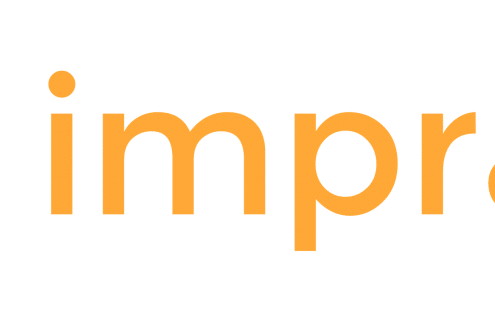
Start A Culture Change With Feedback [reblogged from impraise]
Blog Reblogged from our friends at impraise. Written by Andrea Hak.
Reblogged from our friends at impraise. Written by Andrea Hak.
Every company has their own unique culture. Whether positive or negative, company culture is a set of norms, beliefs, values and vision that define how employees and managers interact within an organization. Whether you have a preset list of company values or not your company has its own culture. The question is how you can shape your company’s culture to fit new norms and objectives you’d like to see in your company?
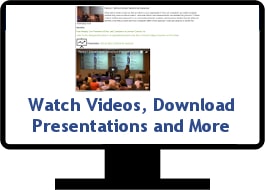
By Design: Ethical Systems conference a great success
Blog Ethical Systems, in collaboration with BSPA, held our first conference, Ethics By Design, on June 3. Thanks to the presenters and attendees, it was the behavioral science equivalent of an all-star game attended by the most passionate fans.
Ethical Systems, in collaboration with BSPA, held our first conference, Ethics By Design, on June 3. Thanks to the presenters and attendees, it was the behavioral science equivalent of an all-star game attended by the most passionate fans.
Close to 80 leaders from the ethics and compliance space, prominent professors from across the country and influential business leaders and thinkers came together to learn from what one participant called “a massive amount of brain power in the room.” And truly, it was. From those who wrote the seminal texts on business ethics to the people in charge of designing ethics programs at top companies, the attendee mix was evenly distributed among both academics and practitioners in order to stimulate dialog, research and connections.

Unethical Amnesia: A Term Big Business Cannot Afford to Forget
Blog Time heals all wounds. Time erodes even the mightiest mountain into a pebble. Time also, as a recent study highlighted in Harvard Business Review, enables people to forget their ethical lapses- a fact that has strong implications for businesses today.
Time heals all wounds. Time erodes even the mightiest mountain into a pebble. Time also, as a recent study highlighted in Harvard Business Review, enables people to forget their ethical lapses- a fact that has strong implications for businesses today.
Researchers found that “memories of unethical actions become obfuscated over time” coining the term “unethical amnesia.” The reason for this amnesia is simple: recalling our own misconduct is a threat to our positive self-image.
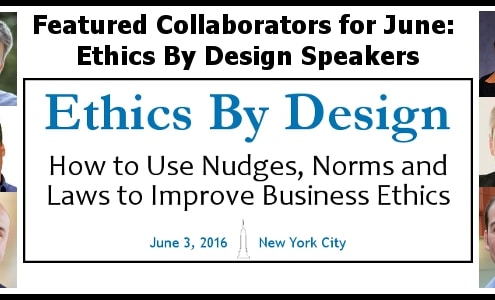
Featured Collaborators for June: Ethics By Design Speakers
Blog Each month, Ethical Systems publishes an interview with one of our esteemed collaborators covering their research and work in an area relating to ethics and ethical systems design.
Each month, Ethical Systems publishes an interview with one of our esteemed collaborators covering their research and work in an area relating to ethics and ethical systems design.
For June, however, we decided to upend that tradition and focus on the wealth of expertise at our conference on June 3rd. Truly, it would not be an Ethical Systems event without a leading group of academics and practitioners exchanging resources and strategies around strengthening the ethical climate and culture of today's business world.

Risking Reputation Rarely Rewarded: Lessons From The Lending Club
Blog The recent news about Lending Club is a prime example of the reputational value of business ethics. Last week, The Wall Street Journal reported the company’s twisted fate – it went from receiving a Tribeca “Disruptive Innovation Award” in April (given to then-CEO Renaud LaPlanche) to suffering tumbling stock prices in May, plummeting from approximately $8 on April 1, to a low of $3.94 on the day (May 16th) the WSJ report came out.
The recent news about Lending Club is a prime example of the reputational value of business ethics. Last week, The Wall Street Journal reported the company’s twisted fate – it went from receiving a Tribeca “Disruptive Innovation Award” in April (given to then-CEO Renaud LaPlanche) to suffering tumbling stock prices in May, plummeting from approximately $8 on April 1, to a low of $3.94 on the day (May 16th) the WSJ report came out.
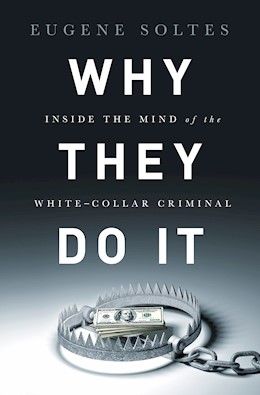
Never Black and White: Eugene Soltes Exposes the Gray
Blog White collar criminals typically conjure images of dark boardrooms, wealthy conspirators and syndicated, international crime rings. Yet, in a new book, Eugene Soltes shows white collar crime is less a cause of pernicious plots and more a product of a lack of focus, proximity and context.
White collar criminals typically conjure images of dark boardrooms, wealthy conspirators and syndicated, international crime rings. Yet, in a new book, Eugene Soltes shows white collar crime is less a cause of pernicious plots and more a product of a lack of focus, proximity and context.
What distinguishes Why They Do It from others on the subject is Soltes’ extensive use of almost 50 interviews with those convicted of white collar crimes- which he defines as individuals in high social standing who committed crimes while doing business. The main takeaway is that corporate leaders are more or less normal people, who are as susceptible to the same conflicts of interest and ability to rationalize decisions made in the moment as the rest of us. By virtue of their position, however, their decisions can do harm not only to themselves but also all with whom they do business.

Featured Collaborator for May: Robert Bloomfield
Blog Interview with Robert Bloomfield, Nicholas H. Noyes Professor of Management and Professor of Accounting at Cornell University’s Johnson Graduate School of Management
Interview with Robert Bloomfield, Nicholas H. Noyes Professor of Management and Professor of Accounting at Cornell University’s Johnson Graduate School of Management
My research reinforces a maxim long emphasized by accountants: it is most useful to view ethical behavior as a result of institutional choices, rather than as a result of moral character. It isn’t that a manager’s character has no effect on the ethicality of their decisions, just that it tends to be swamped by institutional forces—and in general, people are far too prone to attribute ethical actions to character when they are actually driven by environment; this bias is so well documented it has been named the Fundamental Attribution Error. Also, we rarely know a person’s character, and even if we do, we don’t know much about how to change it.

Twice as Nice: On ethics teaching
Blog Can people be taught to be more ethical? While some may say teaching ethics is a recipe for continued headaches and an ongoing, almost Sisyphus-like journey to ensure lessons are absorbed, a new study has positive implications for both academics and practitioners who have dedicated their work to engaging others in ethics education, training and programs.
Can people be taught to be more ethical? While some may say teaching ethics is a recipe for continued headaches and an ongoing, almost Sisyphus-like journey to ensure lessons are absorbed, a new study has positive implications for both academics and practitioners who have dedicated their work to engaging others in ethics education, training and programs.
The as yet unpublished study, covered by Ben DiPietro in The Wall Street Journal’s “Morning Risk Report” and presented at the recent Academy of Management conference, spotlights a key training tactic that will greatly increase ethics knowledge retention and, in the long term, may possibly reduce misconduct.
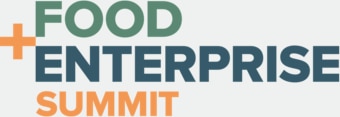
Guarding Ethics: Azish Filabi’s Keynote at Food and Enterprise Summit
Blog What does it mean to eat and shop “local”? While there is no prescribed territory that those in- and in charge of regulating- the food industry can point to, many will generally agree that it is best to avoid regulation around the appropriate use of the term.
What does it mean to eat and shop “local”? While there is no prescribed territory that those in- and in charge of regulating- the food industry can point to, many will generally agree that it is best to avoid regulation around the appropriate use of the term.
While there is widespread disinterest in having officials involved, when businesses cannot agree on how to accurately define, and ethically use, increasingly common terms like “local” (as well as “sustainable”, “natural’, and “artisanal”) it opens the door to participation by regulatory bodies.
Many are drawn to the local food movement because of a passion for community involvement and realizing their role in local economic development. Intending to start, manage or invest in a purpose-driven business, however, is not sufficient without establishing mechanisms to guard the company’s ethics in the long-run. This theme was at the center of my recent keynote address at the Food & Enterprise Summit in Brooklyn on April 8 (audio now available via the Heritage Radio Network). Our motivation to be ethical can only take us so far- businesses need proper corporate governance, accountability mechanisms, and strong community ties to help guard their ethics as the company grows.
